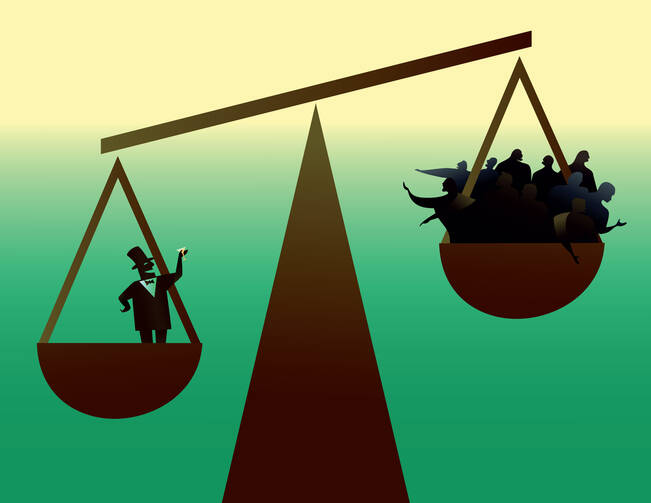It has been 75 years since President Franklin D. Roosevelt signed into law the Fair Labor Standards Act, a hard-fought legislative victory for the administration that set the nation’s first enduring federal minimum wage at 25 cents an hour. The nation passed another milestone in 2013, though one that gives little cause for celebration: Sept. 15 marked the fifth anniversary of the collapse of Lehman Brothers, the first domino to fall in a financial crisis that would spiral into the severest recession since the Great Depression.
Looking back at these watershed moments prompts not only some stocktaking of the current economic recovery but also a question: how much progress has been made toward the laudable goal President Roosevelt described, of “insuring to all our able-bodied working men and women a fair day’s pay for a fair day’s work”?
Four years into a sluggish recovery, housing prices are up, the unemployment rate continues to inch down and the stock market climbs to new heights. But these encouraging numbers belie another disturbing reality: the economic rebound has compounded a decades-long trend of greater income inequality. In 2012 the top 1 percent of earners captured their largest share of income since the Roaring ’20s and the top 10 percent took home a record 48.2 percent of total national earnings. While corporate profits have surged, thanks to increased efficiency (largely from cutting jobs and wages), median household income remains stuck below the pre-recession level, and one in seven Americans lives in poverty.
This new Gilded Age is no accident of history. While globalization and technological shifts contribute to the widening gap, so too do government policies. Less progressive tax rates, especially tax cuts on capital gains and dividend income, explain much of the increased disparity. And however necessary the bailout of Wall Street may have been to avoid an economic abyss, banks and their well-off investors undoubtedly profited from the intervention. Meanwhile, the real value of the minimum wage has steadily decreased since hitting its peak of $10.77, in current dollars, in 1968.
Intensified advocacy for better wages in recent months is thus a welcome development. The Obama administration has called for increasing the minimum wage from $7.25, the rate set in 2009, to $9 an hour. Fast-food workers in cities across the country have held strikes demanding $15 an hour—double what many workers earn now. In July the City Council of Washington, D.C., approved a measure that would have required large retailers to pay a “living wage” of $12.50, but failed to override Mayor Vincent Gray’s veto of the bill.
In response to these calls for better pay, opponents of increasing the minimum wage voice an argument recycled from the 1930s: wages set above the natural market rate will lead to higher unemployment and endanger the fragile economic recovery. Of course, it was in the midst of an even deeper economic crisis, the Great Depression, that the first minimum wage law was passed, not only to alleviate the suffering of workers, but because it made economic sense. “In periods of business recession,” President Roosevelt argued, paying poverty wages “has a serious effect on buying power.”
Putting money in the pockets of those who cannot afford to save can not only stimulate spending, but could temper the uneven distributional effects of the recovery to date. And despite countless studies on the employment effect of a minimum wage, economists have not consistently found a statistically significant correlation between an increase in the minimum wage and job loss. In fact, a study by the Economic Policy Institute found that a $2.85 increase in the minimum wage would generate $32 billion in economic activity and translate to roughly 140,000 new jobs.
Others make the argument that the minimum wage should be seen as a short-term “training” wage for low-skilled or young workers. But in today’s economy, too many workers can find reliable employment opportunities only in what has traditionally been a low-wage sector, retail and fast food, while manufacturing jobs, once a ticket to the middle class, continue to disappear.
But perhaps the strongest argument in support of increasing the minimum wage comes not from economics, which will always be disputed, but our Catholic tradition. Those who work full time should be able to provide for themselves and their families, a right supported by over 100 years of Catholic social teaching, starting with Pope Leo XIII’s “Rerum Novarum” (1891). The right to a just wage is rooted not in the freedom of the contract but the transcendent dignity of every human being.
Pope Francis has called upon nations to pursue economic policies that “serve humanity, beginning with the poorest and most vulnerable.” Though no panacea, moving the minimum wage closer to something like a just wage is a good place to start.








